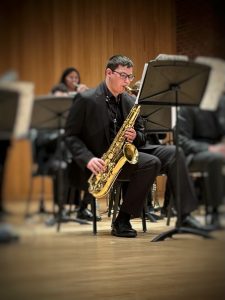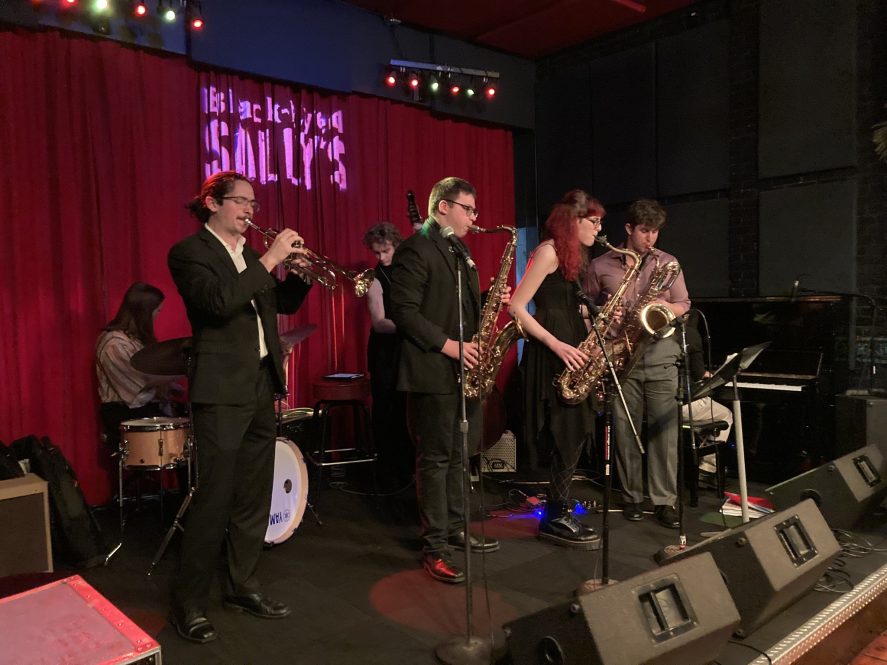The fact that Michael Farina ’26 (SFA) has nearly 100 standard jazz tunes memorized might seem impressive. His goal of 300 might seem extraordinary.
But John Mastroianni, an assistant professor-in-residence in UConn’s music department and Farina’s saxophone instructor, says what’s really amazing is that Farina knows just about everything there is to know about jazz legend John Coltrane.
“It’s such a strong word, but Michael has become an authority on the music of John Coltrane. He’s made it his life’s work to be so passionate about him,” Mastroianni says. “Coltrane is one of the greatest jazz artists of all time, and Michael has spent the last few years transcribing and listening to him. The facts he can spit out about this man and about his legacy are absolutely astounding.”
Farina says Coltrane is both his biggest musical influence and a personal inspiration. And besides both playing tenor sax, the two also have something else in common – recognition from DownBeat magazine.
Coltrane’s came in 1965 when he was inducted into its prestigious Jazz Hall of Fame. Farina’s came this summer, when he was honored for Outstanding Performances, one of six college undergraduates worldwide to make the list and the only tenor saxophonist.

The honor is one that surprised Farina, who recorded his audition after only one semester at UConn last year. DownBeat is known as the authority on jazz and its history, publishing reader polls and critical reviews since the 1930s that often have proved to make or break careers. To be featured in it at all is a feat, never mind as a first-year student.
Mastroianni says Farina was “flabbergasted” when he gave him the news because he just couldn’t imagine he’d ever receive such a distinction.
“He’s a rare individual that has achieved a level of artistry that many professionals would aspire to,” Mastroianni says. “He’s going to be a formidable force in the music world. And one of the interesting things about him is that he’s so quiet and humble. He has no idea how good he is.”
Farina is the first student in the School of Fine Arts’ new Bachelor of Music in Jazz program, a more performance-heavy track than the existing Bachelor of Arts in Jazz Studies. He wants to add in an English major and says he is unsure of what he’ll do with the combined expertise but wants the rounded experience.
It’s why he came to UConn, he says.
The University allows for many unlikely pairings of majors to fit students’ goals. Plus, UConn is about 2½ hours from Farina’s hometown of Ossining, New York, close enough to family yet far enough to explore life on his own.
“The third reason is Professor Mastroianni,” Farina says. “He’s so wonderful and fun to be around, and he’s such a good teacher, a real teacher. Sometimes professors give the sense they’re teaching because it’s a stable job. But Professor Mastroianni is a natural teacher, and you can sense it in the way he treats his students and how he talks to people.”
He gave Farina an opportunity recently to take pen to paper and write a two-part series on Coltrane for the Connecticut Music Educators Association’s magazine, in which Mastroianni writes the regular column, “John’s Jazz Corner.”
Seeing his name in print is something Farina describes as thrilling – and this might not be the last time.
He’s been writing music for small groups for a while, he says, but this summer restarted a larger project he began some time ago composing a piece for a full jazz ensemble.
“A lot of the emphasis is going to be on the solo section,” he says, adding, “it’s not as difficult as you might think because it’s based on an arrangement that already exists, not a big band arrangement, though. I’m taking a small group arrangement and adding my own stuff to it before finishing it and closing it off. I have an idea of where I’m going with it and what elements of my own I want to put in.
“But it’s a tough thing to do because you might have something that sounds good with the computer playing all the instruments, then once you get a band together to play it, you’ll hear that something doesn’t sound right, and you need to change it,” he continues.
Along with Mastroianni, Farina credits his middle and high school teachers, his private instructors, and the Litchfield Jazz Camp, which he’s attended the last three summers, with getting him to where he is today and giving him the drive to continue.
“I like to solo,” he says. “It’s the core of jazz. There’s so much that happens every time you perform a solo, especially when you’re playing with musicians who you’re comfortable with. The better you know the music and the musicians the more that soloing experience becomes musically dynamic. It can go off in a million different directions and that’s really satisfying.”
Mastroianni explains it like this: A solo that’s performed at 9:57 on a Thursday morning will never be repeated because a jazz musician who is adept in improvisation – that is, spontaneous composition – will never repeat a solo verbatim.
It’s something that’s “totally lived in the moment,” he says.
“A jazz musician is judged on how they improvise and by their creative output. That’s not to say people don’t play ‘licks’ that they practice when they improvise, but, ideally, the same solo should never happen again, and that’s the beauty of this art form,” Mastroianni says.
Farina hasn’t always been drawn to jazz, he admits, explaining that when he was a baby a musical toy in his crib was his first instrument. Then he started to listen to music geared to young children by Dan Zanes and graduated to Bruce Springsteen in preschool. The Beatles came in elementary school, and in fourth grade he picked up the saxophone, joining the jazz band in middle school.
“I just liked how it sounded,” he says of the saxophone. “As corny as it is, songs like ‘Rockin’ Around the Christmas Tree’ sounded really good to me. I thought the instrument sounded cool and looked cool.”
Since then, he’s added to his repertoire of 100 songs tunes like “The Night Has a Thousand Eyes” by Jerry Brainin, “But Not for Me” by George and Ira Gershwin, and “Summertime” by George Gershwin.
“Michael could get a full scholarship to any music school in the country and that’s no exaggeration, but he came to UConn. Not only does he have a passion for music but also for English, and a wonderful thing about UConn is that he can study both,” Mastroianni says. “That’s a pretty cool thing.”



